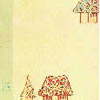 The world is shockingly louder after hearing Andrew Chalk's work. This is true of many of his pieces, but seems most applicable to the reissue of East of the Sun. Originally released in 1994 on cassette by OR (Ora's label), the album is as quiet and reserved as they come, teeming with invisible life that always seems just beyond the reach of the human ear. There's plenty going on in these washes of sound, but everything seems consciously subliminal from the second the album begins.
The world is shockingly louder after hearing Andrew Chalk's work. This is true of many of his pieces, but seems most applicable to the reissue of East of the Sun. Originally released in 1994 on cassette by OR (Ora's label), the album is as quiet and reserved as they come, teeming with invisible life that always seems just beyond the reach of the human ear. There's plenty going on in these washes of sound, but everything seems consciously subliminal from the second the album begins.
Faraway Press
Chalk's records always feel like something special, his Faraway Press releases are especially unique and memorable because they're so carefully assembled. East of the Sun comes in a heavy duty gatefold case with elegant and simple artwork. The inside contains only the most pertinent information and a single photograph, presumably of Chalk. As heavy as the packaging may be, the music is perhaps the most delicate Chalk has ever assembled. There are no monumental drones to speak of or massive washes of sound that swim out of the music. Everything is a gentle, microscopic whisper. Even with the volume turned up to its fullest, both "Winter Arc" and "High Water" seem dark and distant, glimmering only faintly, suggesting some distant signs of life.
When the music does uncover itself most blatantly, the resonance and power of the sounds involved is undeniable. The simplicity of both compositions remind me of taking a long walk and being lost in thought or, perhaps more strongly, the sudden realization that there's something going on around you that was not or had not been immediately evident. There are no big surprises on this album: everything comes naturally, but the way Chalk's various sounds work their way in and out of the mix demands repeated listens. I found myself asking where certain sounds came from and how they managed to sneak into the mix without me noticing them earlier.
In the right environment this is a splendid aspect of the album: it commands a quiet place and causes the ears to listen harder, be more attentive. If a quiet place is impossible to find, then this record is difficult to hear and gets subsumed into other noises. I was washing my clothes in the basement while listening to this album upstairs and it slowly fused with the whirl of the washing machine. There's nothing inherently wrong with a quiet album, but unless combining music with household appliances sounds like fun, this album is perhaps best suited for the quietest of times or for a pair of good headphones.
samples:
Read More

